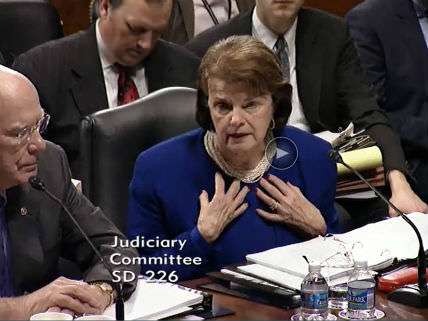Even If the Navy Yard Shooter Did Not Use an AR-15, His Crime Shows Why AR-15s Should Be Banned

Yesterday Sen. Dianne Feinstein (D-Calif.) jumped on reports that one of the weapons used by Aaron Alexis to kill 12 people at the Navy Yard in Washington was an AR-15, which in her view is suitable only for mass murder even though it is the best-selling rifle in America:
There are reports the killer was armed with an AR-15, a shotgun and a semiautomatic pistol when he stormed an American military installation in the nation's capital and took at least 12 innocent lives. This is one more event to add to the litany of massacres that occur when a deranged person or grievance killer is able to obtain multiple weapons—including a military-style assault rifle—and kill many people in a short amount of time. When will enough be enough?
Last night CNN talk show host Piers Morgan was similarly outraged, telling gun control critic John Lott:
You and I have debated this after almost every mass shooting in the last three years….You guys just never accept that the gun itself [can] ever be part of the problem….The Washington Navy Yard is heavily secured. It is crawling in armed security, people, arms, police. And yet it was still infiltrated by a man with a legally purchased AR-15, who just committed the same kind of atrocity as we saw at Sandy Hook and Aurora. And yet I'm sure, John Lott, you're going to explain to me now why the solution is not to deal with that gun which keeps being used to do these atrocities but is to arm even more people in that building.
Whoops. Today CNN reported, based on information from FBI officials in Washington, that Alexis did not have an AR-15 after all. He was instead armed with a shotgun (the firearm endorsed by Vice President Joe Biden for all legitimate self-defense uses), which he brought with him, and a pistol he seems to have taken from a guard at the Navy Yard. "Contrary to previous reports that had been widely circulated," says the Los Angeles Times, Valerie Parlave, assistant director in charge of the FBI's Washington field office, "said Alexis did not use an AR-15 semiautomatic weapon." According to CNN, "Military personnel that were responding to the shooting were carrying maybe one or more AR-15s, and that's where the confusion came from, initially from law enforcement. That's why that was reported."
Does it really matter? CNN says no, and here's why:
It has been called the most popular rifle in America, and it briefly returned to the spotlight after Monday's shooting at the Navy Yard: the AR-15….
Federal law enforcement sources told CNN Tuesday that authorities have recovered three weapons from the scene of the mass shooting, including one—a shotgun—that investigators believe Alexis brought into the compound. The other two weapons, which sources say were handguns, may have been taken from guards at the Navy complex.
The sources, who have detailed knowledge of the investigation, cautioned that initial information that an AR-15 was used in the shootings may have been incorrect….
Regardless, the massacre pushed the AR-15 back into the gun-control debate.
That regardless is doing a tremendous amount of reality-denying work. Thus does inaccurate reporting justify yet another round of ill-informed demands for an "assault weapon" ban like the one Feinstein failed to pass last spring. CNN is right that the exact model Alexis used is irrelevant: Whether or not his weapon was on the list of scary-looking guns Feinstein would like to ban, his victims would be equally dead. But that fact merely illustrates the folly of trying to save lives by banning the weapons allegedly favored by mass murderers.
Speaking of which, a survivor of the 2009 Fort Hood massacre told Morgan last night that the AR-15 is "the preferred mass shooter's weapon of choice." In fact, mass shooters are more likely to use handguns than any type of "assault weapon." But even if every mass shooter used an AR-15, it would not follow that eliminating AR-15s (something Feinstein's bill does not purport to accomplish) would eliminate mass shootings, or even make them a little less common or deadly, since equally effective alternatives would still be readily available.


Show Comments (116)